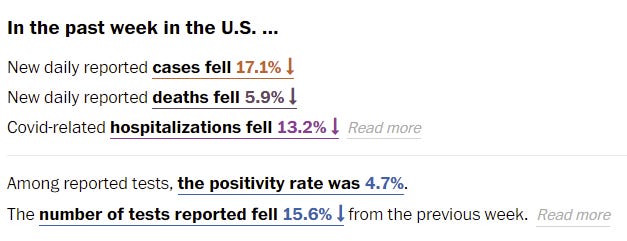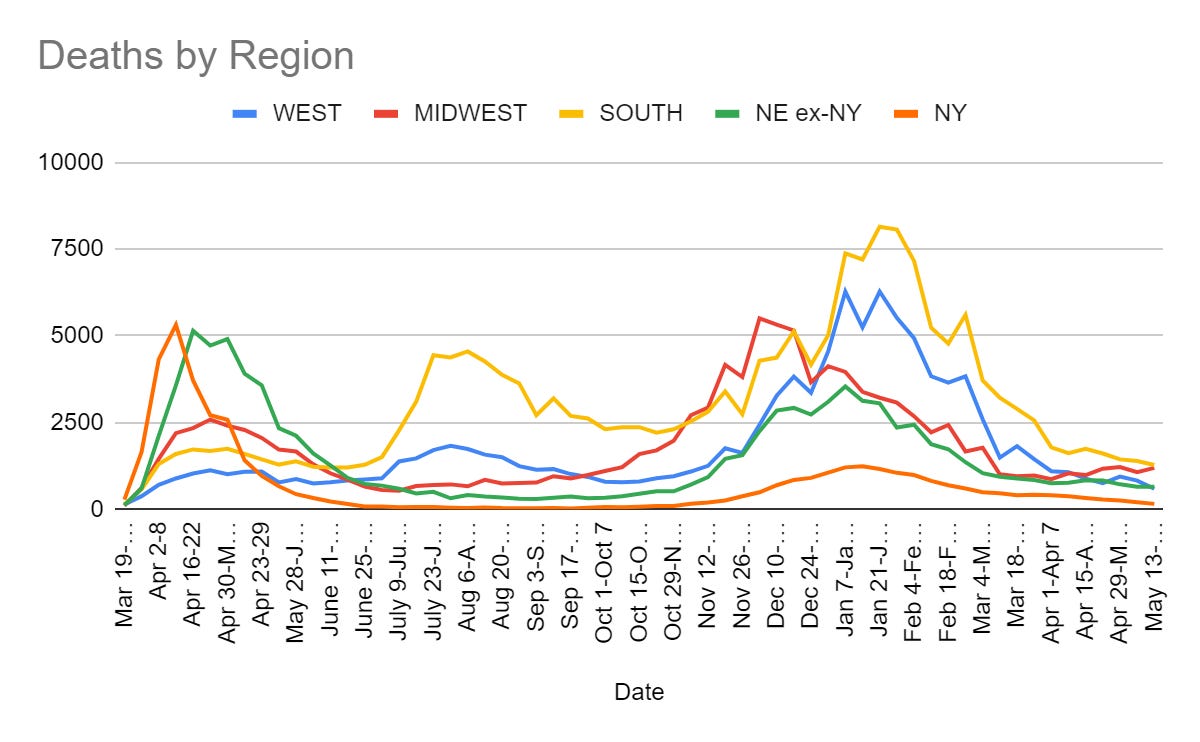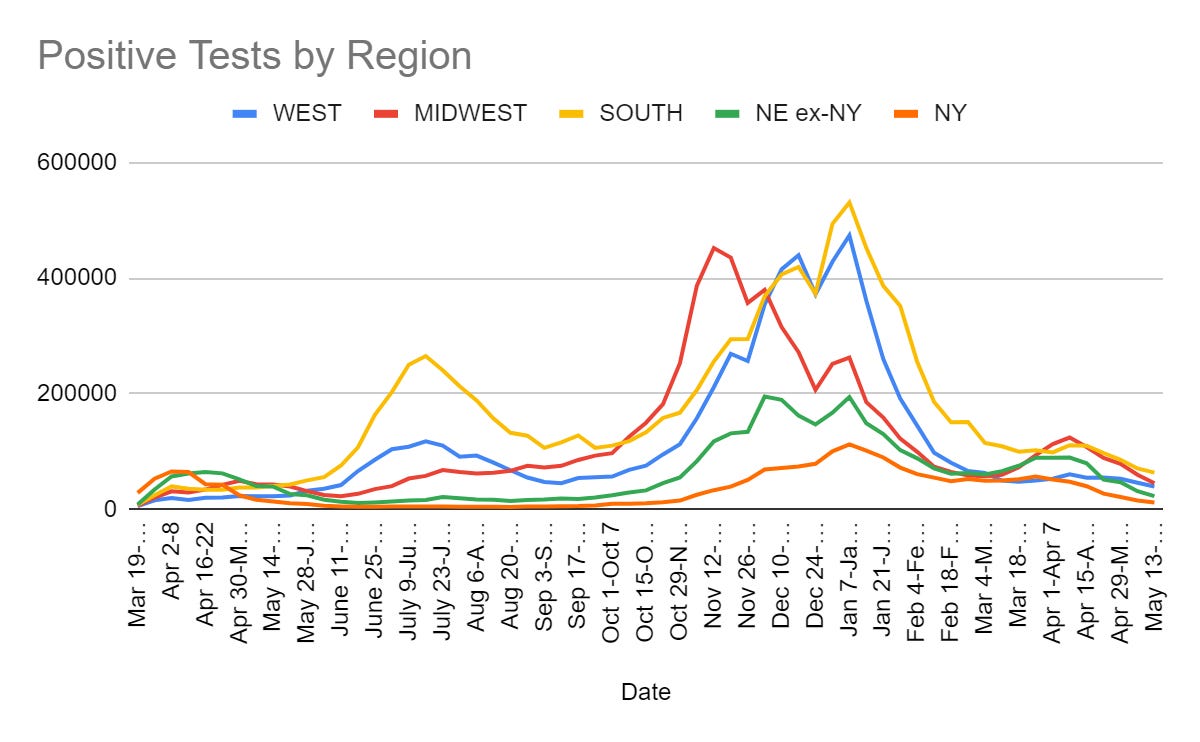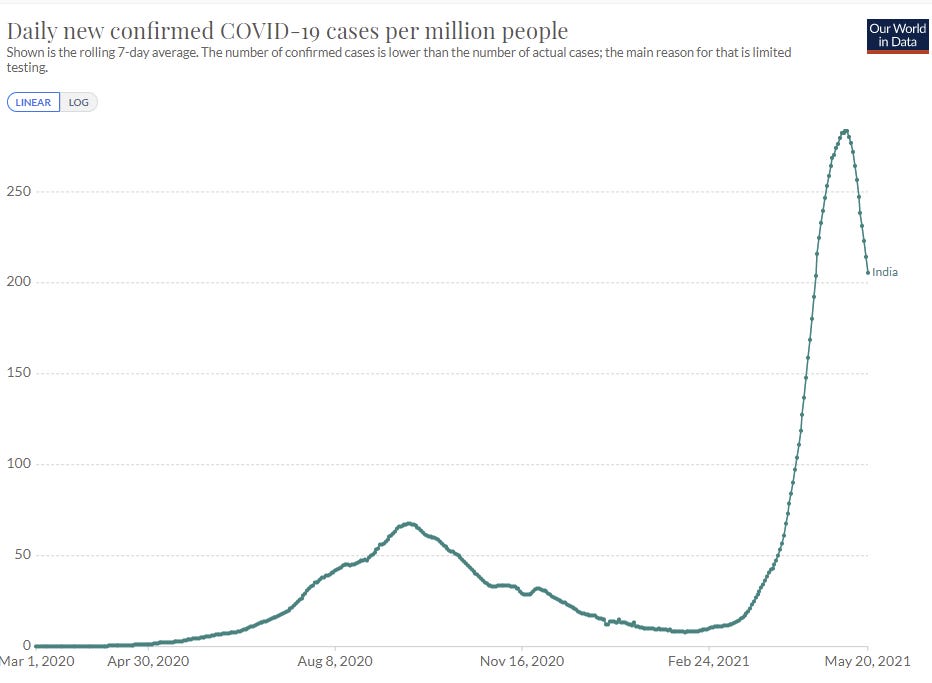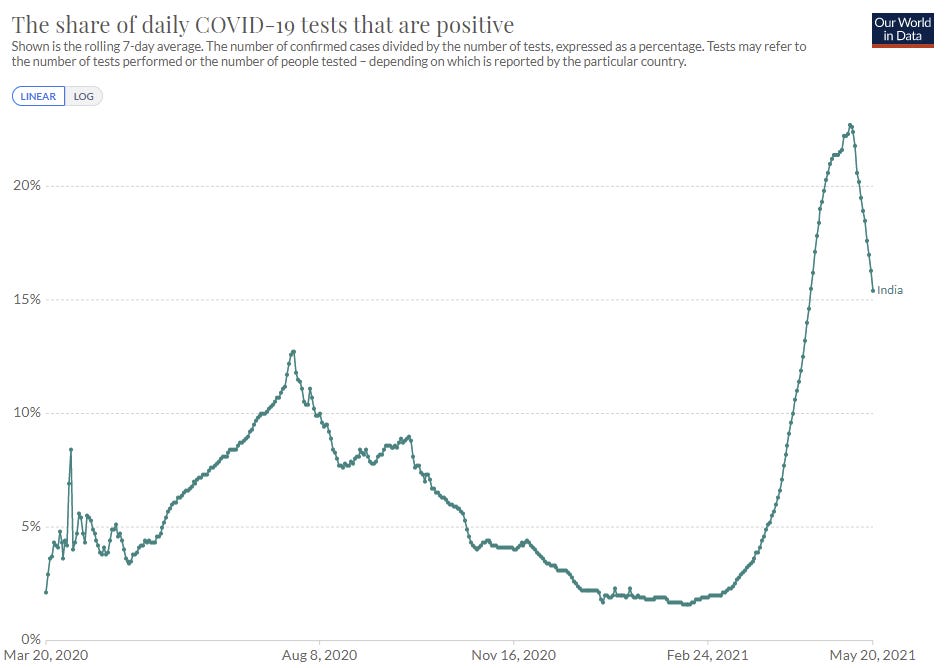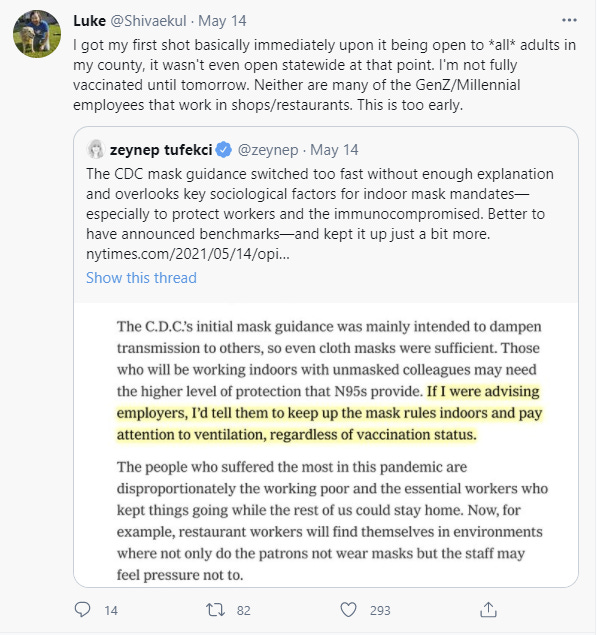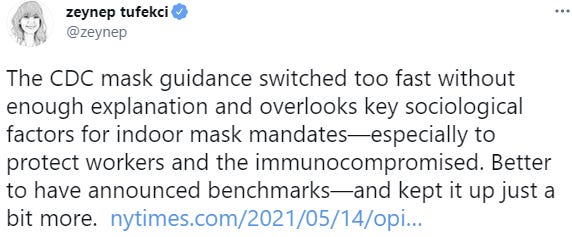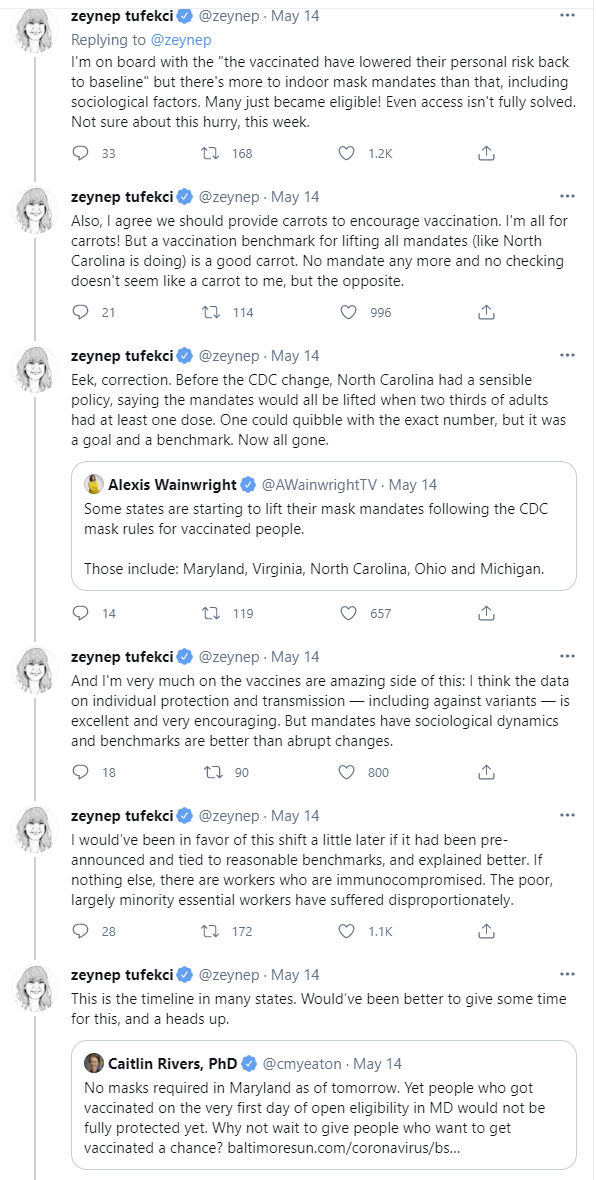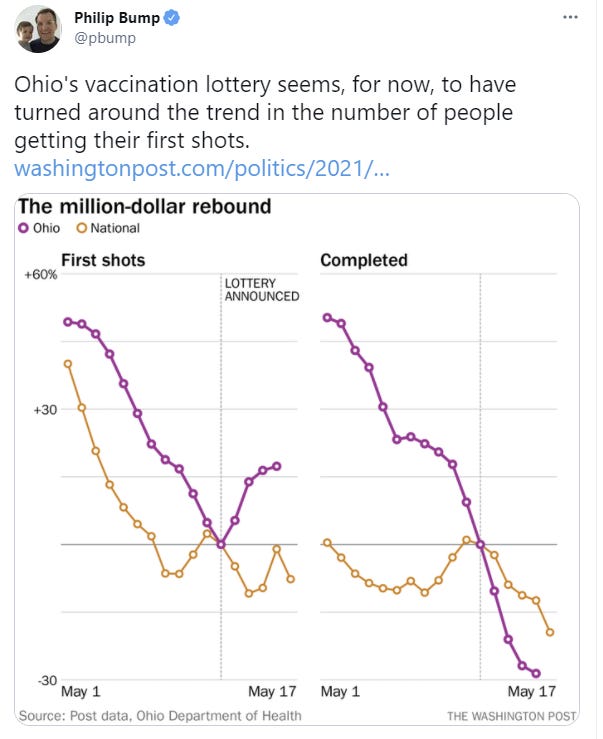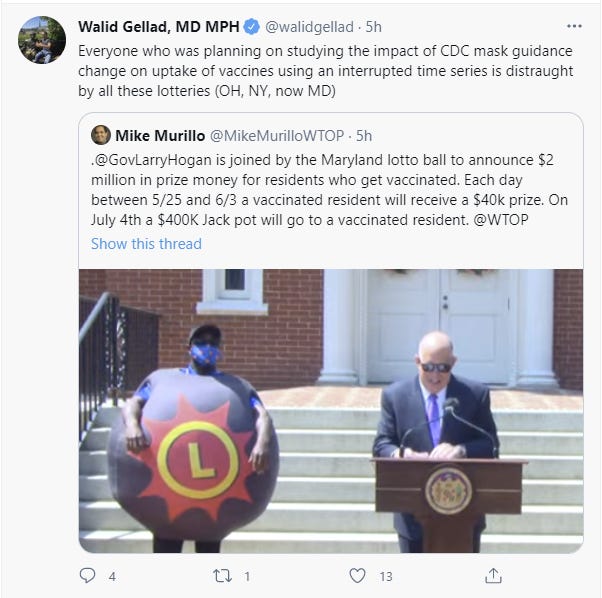Covid 5/20: The Great Unmasking
The CDC has lifted its mask mandate for vaccinated people. In one fell swoop, it is suddenly fine for anyone fully vaccinated to go maskless anywhere, without social distancing, at any time, so long as regulations and rules permit it. This retains the madness of ignoring partial vaccination entirely, and the madness of making children as young as two (!) wear masks around groups of fully vaccinated adults, but it is certainly a huge step towards sanity. It also implies that the rules and regulations that remain need to be changed, and many of them are indeed being changed.
Reactions were mixed.
There was much rejoicing. Many cried tiers of joy. Others pointed out that this was a damn good reason to get vaccinated.
There was also much confusion and opposition. Very Serious People expressed panic and horror. Others expressed reasonable concern that this was premature. This would destroy mask mandates, causing maskless people to go around maskless. People would go around acting like the pandemic was over before there was full ‘herd immunity.’
The opposition has some legitimate points. The control system could still have some fight in it. We have no way to verify verification status that anyone is willing to use. Vaccination checks are mostly going to be either non-existent or on the honor system, and America does not highly value honor. Norms that are ignored by half the people are easy for the other half to choose to ignore as well. At a minimum, this will change norms in ways that slow down the decline in cases. If everyone were to use this as a reason to go fully ‘back to normal’ at current vaccination rates cases would presumably start rising again at least for a while, and it’s not clear we could do much of anything to reverse course if that happened beyond pushing harder to get more vaccinations.
A lot of people also pointed out the contradictions between this new policy and the old one, with the change from ‘take precautions that wouldn’t even make sense if you were unvaccinated’ to ‘once vaccinated take no precautions whatsoever’ coming overnight with zero warning, with little or no change in the underlying physical conditions. I think it’s important not to make a big deal about that. Yes, the contradictions are huge and blatant, but the time to point out how crazy the old guidance was was when they were still in place. As many people did, frequently. Admitting one is wrong and correcting errors needs to be rewarded and encouraged rather than punished and piled onto.
Despite the risks, and it plausibly being slightly too soon (on the order of a few weeks) to do this full blast, I think this was absolutely the right move to make. I congratulate the CDC on its newfound wisdom. Now let’s work on the insane mask and distancing mandates that still apply to children, and on updating rules and regulations to reflect the newly acknowledged realities of the physical world. I’m happy to have gone from ‘worried about Covid when going outside’ to ‘worrying about insect bites eating me alive when going outside’ to this week’s ‘worrying about seasonal allergies when going outside.’
Also, let’s run the numbers.
Author’s note: It’s been a hectic week, which is why this is going out in the late hours. Some stuff likely got left out due to that, other stuff got only a link without a discussion.
The Numbers
Predictions
Prediction from last week: Positivity rate of 3.0% (down 0.4%) and deaths decline by 10%.
Result according to Washington Post:
So they’re saying that cases fell 17%, tests fell 16% and the positivity rate is up from 3.4% to 4.7%. Yeah, no. Sorry Washington Post, this is even more obviously nonsense than before. Let’s see Johns Hopkins.
That seems more like a thing that could possibly have happened. They have 3.0% positivity rate, down from 3.2% (a 0.2% drop). That’s still an overshoot, and somewhat disappointing, but test counts are also dropping rapidly.
Prediction (now using Johns Hopkins numbers fully going forward): Positivity rate of 2.7% (down 0.3%) and deaths fall by 8%.
It has been seven days since the CDC updated its guidance. That’s not quite enough time that we would start to see the effects of the change. We won’t see the full effects next week because this kind of shift in behavior happens slowly, but by next week we will know if we have made a huge mistake.
Thus this is an important week. If conditions continue to improve at a similar pace, we have won.
I think there is roughly a 75% chance that we’ll see things going along that path. Then there’s about a 15% chance that there’s a noticeable change but not one that makes me worry that things are about to get worse, with confidence that ongoing vaccinations will keep things contained. Then that leaves a 10% chance that things get concerning, and the decision to change standards will look dangerously premature.
Deaths
DateWESTMIDWESTSOUTHNORTHEASTApr 1-Apr 7109886717891160Apr 8-Apr 141070103716211145Apr 15-Apr 2188398717471168Apr 22-Apr 28752117316091110Apr 29-May 594312201440971May 6-May 1282610691392855May 13-May 1959211941277811
Overall a slow but steady decline, but that hides a big decline in the West and a backslide in the Midwest. I doubt either of them reflect a major real shift, and I’m guessing they mostly cancel out, and we likely saw a slightly higher real drop than we observed, given past infection data.
Cases
DateWESTMIDWESTSOUTHNORTHEASTApr 1-Apr 752,891112,84898,390140,739Apr 8-Apr 1460,693124,161110,995137,213Apr 15-Apr 2154,778107,700110,160119,542Apr 22-Apr 2854,88788,97397,48278,442Apr 29-May 552,98478,77885,64168,299May 6-May 1246,04559,94570,74046,782May 13-May 1939,60145,03063,52934,309
Good drops across the board, with very large drops continuing in the Midwest and Northeast. You love to see it. If this doesn’t change direction soon, it will soon be over.
India
Looks like India will be through the worst of things within a few weeks. Perhaps the elections or various festivals were major contributors to the issue. Maybe the control system is simply that strong anywhere and everywhere. Somehow, trends have reversed and things are rapidly improving, although deaths won't come that far down for a while and the hospitals will remain in dire straits.
I do not buy 'seasonality' as an explanation here because you would have seen more of a gradual phase transition and plateau, rather than a dramatic reversal. This is humans making different choices.
The Great Unmasking
If there was any doubt that changing CDC guidance would have a cascading effect on other guidance and on behavior, those doubts were put aside quickly.
Many jurisdictions and private entities come in line with the new principles within days. For example, here’s Pennsylvania falling in line within 4 hours. Anyone not falling in line is coming under increasing pressure to do so. Here’s New York falling in line a few days later, with an exception (that I fully support) for public transportation. Here’s Massachusetts declaring that we have normality. Here’s the US Senate. For a change of pace here’s Trader Joe’s, along with a general ‘too much too soon’ objection.
My previous prediction was that if the CDC were to update its guidance in sensible ways, that elite opinion would fall in line with that. Those defending the old guidelines would shift to defending the new ones because their actual algorithm is to defend the official line, so opposition to a change before it happens is a very different thing from opposition to a change after it is announced.
What we saw was that everyone’s opinion on the science seemed to move on the spot, and everyone agreed that oh yes, fully vaccinated people are at and present minimal risks. That’s definitely not what a lot of those same people had been saying directly before the announcement.
Still, we saw objections that the science was accurate, but this was still too much, too fast, too soon. The CDC might have abandoned its scare tactics and worries, but that problem was clearly going to be a lot stickier. As well it should be a sticker problem. There’s some very reasonable objections to deal with.
The objections seem to be something like (using the term ‘we’ here for ease of comprehension to refer to the Powers That Be and their decisions):
Vaccinated people still can spread the virus to some extent, and it’s thus irresponsible to encourage them to do less prevention, since every bit of prevention helps in a pandemic.
We still don’t know the extent to which the virus spreads among the vaccinated. We know more than we did before, we can no longer say ‘no evidence’ or anything, but it’s not as robust as we’d like.
If we tell people they can take their masks off and stop distancing once vaccinated, people will think the pandemic is over, and do all sorts of irresponsible things, whether vaccinated or not.
Mask mandates are all or nothing. If you don’t make the vaccinated wear a mask, you can’t tell the unvaccianted to wear a mask, they won’t listen to you. The norm won’t survive.
Unvaccinated people can just lie and claim to be vaccinated, either implicitly or explicitly, and it’s clear we have no appetite to check.
Because of the temptation to lie this could lead to vaccine passports.
With the new CDC guidelines there will be pressure on private venues and corporations to drop their mask mandates even when and where they still make sense. People, especially in the areas with less vaccinations, will grow hostile to mask requirements.
The whiplash of this decision, going from ‘vaccination buys you very little’ to ‘pandemic over if you get a shot’ in one go, will erode trust and make us look like hypocritical idiots.
In particular, our claims that ‘science has evolved’ and similar are laughable on their face and open us up to several angles of attack. If science ‘evolves’ like that then you can question it, expect it to change and so on, rather than Believing Science. Plus no, it didn’t ‘evolve’ and nothing changed in the past week or two other than the political reality. The whole thing will look really bad and wasn’t implemented well (WaPo).
The contrast with children still being asked to wear masks even though (and kind of because) they are not eligible for the vaccinations yet, and people who are mostly vaccinated still being told to wear masks, won’t go over well.
People have calibrated to the CDC being absurdly overprotective and giving an upper bound on precautions. Once people expect that, you can’t then move to a reasonable average level of precaution, because people will misinterpret it.
There hasn’t been enough time for everyone, even all essential workers, who want to get vaccinated to get fully vaccinated yet, and you’re forcing those folks to get exposed to maskless people, some of whom will be unvaccinated. Why not wait a few weeks?
Cases are declining rapidly now. We can cut cases in half quickly, and then do this at a more comfortable level. Why not wait a few weeks?
If we are wrong and this blows up in our face, there’s no way to reverse course.
The whole thing is confusing, especially for those dedicated to not thinking. I don’t think this is an actual problem and people can handle it, but it’s a (small) cost.
The last objection, #14, is the one I take most seriously. As I noted above, I think this will probably lead to a large improvement in quality of life and people’s ability to live it, without having a major impact on case counts. But what if that’s wrong?
If that’s wrong, we’re stuck. There is no going back. Tell the vaccinated they have to mask up and distance again, and they will quite reasonably look at you with one voice and tell you ‘no.’
If a new variant shows up that breaks through and infects the vaccinated, things could get especially ugly, although that could possibly create a justification to reimpose masking and distancing, at least until people get the presumed booster shot.
If things go wrong purely because too many of the unvaccinated stop taking precautions, that would be unfortunate. In the long term it would be self-correcting, in the sense that those taking the risks would slowly get vaccinated and also steadily get infected, but that could take a while and could involve substantial numbers of cases and deaths.
What could be done in that situation would be to start checking vaccination status, or otherwise put more pressure on the unvaccinated to get their shots, in addition to the whole ‘offer them their lives back’ bid and the current host of small bribes. The question is to what extent that would work. Certainly there would be a lot of pressure to start implementing and using vaccine passports if cases start going up again.
I listed that pressure as an objection #6 here, because many people strongly dislike them, rather than because I am part of that group. I think it is highly unlikely (5%?) to come to this, but If I had to choose ‘none of us get our lives back’ or ‘the vaccinated get our lives back but have to show their status every so often for a while’ I definitely go with the second one, despite the risk that this turns into a longer-term concern.
Unvaccinated people will definitely take advantage of the situation, as objection #5. In general, those refusing vaccination are largely those who don’t take Covid-19 seriously, or think they’ve already been infected (which all go together, for obvious reasons) so it makes sense they’d treat the rules as stupid. I don’t know how many would be willing to explicitly lie when asked, especially since many of them tie their identities and tribal allegiances to not getting vaccinated - a kind of ‘best-case scenario’ might result if masks became associated with vaccine resistance going forward. In my experience, a remarkably large number of people still think outright lying is a big deal in most circumstances.
The other problem with the ‘sometimes people just lie’ equilibrium, other than people getting to ignore the mask requirement if they want to, is that we’re effectively putting a tax on being honest and unvaccianted, as opposed to one on being only unvaccinated. This seems different than denying access to life saving medicine to those who don’t lie, but it’s still fundamentally the same problem, and yes it matters.
The question of how much the honest will let this stop them is also open. Objections #3 and #4 speak loudly here. My expectation is that there will be places that say ‘everyone wears a mask’ and they’ll mostly be able to hold that line if they’re willing to bear the costs of that (which are objection #7, and could rapidly become large), but anywhere that doesn’t hold that line will not have an easy time enforcing this by halves.
I also don’t see this as an obvious ‘mask mandates are good and getting rid of them is bad.’ Mask mandates have costs and benefits, and over time they become worse and worse deals, be they private or public.
This also plays into objection #11, where people have given up their agency in order to sacrifice to the CDC guidelines, or treated the guidelines as the strict upper bound on plausible precautions, and now have the CDC guidelines pointing to a different more reasonable place. If the CDC plans on leaving all its other guidelines in the ‘you should wash your hands for 20 seconds again, because science’ mode, the recalibration from this adjustment is going to be actively unproductive rather than helpful, and give false hope for the future. So this is definitely a downside there, and also does risk a full version of #3. It’s something to keep an eye on, but so far it seems like people are not stupid, and have noticed this isn’t a typical CDC guideline. It’s worth tracking that carefully.
The science on vaccines preventing infection has been in for a long time, but the Science(TM) on it was only conclusive more recently. That’s some of what’s causing this shift. Some are still protesting that it’s not fully in (objection #2) but I don’t think this is a reasonable objection at this point. It’s more of a fully general ‘you can’t ignore that which you can’t fully quantify using our exact method’ objection. Objection #1 by contrast is valid if you think that we are likely to end up ‘on the edge’ between suppression and failure, which I do not expect but acknowledge is possible.
What about objections #8 and #10? How bad are the optics on this? My first response is that I’m happy for the optics to be terrible, because those are accurate optics. People will form a more accurate model of the world and plan accordingly. Also, this day will have to eventually come regardless, so it’s not clear to me how much could be done about it. The contrast with children is especially embarrassing, but also I can be hopeful it will lead to the right answer and get children unmasked soon.’This right decision will expose our other wrong decision as wrong’ is not the strongest of objections.
From what I’ve seen, regular people are far more happy for things to be improving than they are angry about the whiplash or contrasts. There’s a lot of forgiveness available, without even the need to ask for it.
That leaves the timing objections, #12 and #13. I am somewhat sympathetic, as the timeline for those who got Moderna is rather tight.
If the vaccine ‘turned on’ fourteen days after the second dose, I’d be highly sympathetic to this argument. We’d be giving such folks a very short window to get vaccinated in time for the unmasking. Those who waited until appointments were easy to get aren’t done.
The thing is that the vaccines finish their work faster than that. The final result is likely in a full week faster, and even ten days after the first dose you’re mostly already safe. It might not yet be fully reasonable to say everyone needs to be finished just yet, but it’s very reasonable to say everyone should be two weeks out from their first dose.
Combine that with the lag between changing guidelines and changing behavior, and the fact that ‘safe’ versus ‘unsafe’ is not a boolean distinction, plus the drop in cases that’s already happened and the additional drops baked in and won’t be reversed likely ever and definitely not for enough time to get vaccinated, and the amount of ‘risk’ we are forcing onto people seems highly acceptable to me.
What would we have gotten by waiting a few more weeks? We could have cut the remaining risk by something like half (until we started approaching some new equilibrium), and given everyone enough time to be fully vaccinated, with an additional three week delay. I don’t think that’s worth it for this reason, but plausibly could be in combination with concern #14. Here’s Zeynep, who is always thoughtful:
The objection that some workers are immunocompromised is valid, but I don’t see this as anywhere near big enough to move the answer this much, especially considering there is nothing stopping employers from keeping their mandates. Mostly it seems to take the form of ‘we can’t do this because there’s a non-zero number of people who this makes unsafe’ with no attempt at a cost-benefit analysis. As I mentioned above, saying the timeline was a little tight is reasonable, I just don’t see it as important enough to wait. I’m even less very sympathetic to ‘goal and benchline’ style thinking, which seems like collective punishment for those who don’t get vaccinated fast enough more than anything else. I’m especially unsympathetic to saying that the new guidelines mean the CDC isn’t “following the science” or that this isn’t “science based.”
The Next Unmasking
We have begun restoring sanity and life to the adults, yet we remain sufficiently crazy that the children still need our help. Fauci is letting us know.
I often see it pointed out that Europe never went in for this idea of masking young children. When things were going badly and we needed all the help we could get from every lever we could pull, this seemed terribly inefficient but I at least understood this as a policy, even if in practice it mostly was used as an excuse to do things like close or limit playgrounds and otherwise destroy childhood and make life as a parent or child that much more expensive and unpleasant without making anyone safer.
At this stage, it makes zero sense. The reason we don’t have the ability to vaccinate our youngest children is that we correctly realized it was not a priority to do so. Such children are at almost zero risk from Covid-19. If they are at sufficient risk from Covid-19 that they must mask, then your risk tolerance is so low that you’re effectively against the existence of childhood. That does seem to largely be our society’s position, as we go around doing things like arresting parents for letting kids play on their own the way kids always used to, or forcing those kids to periodically report to things we euphemistically call ‘schools’ for their ‘education.’
It’s still true that an unvaccinated five year old is safer from Covid than a fully mRNA-vaccinated senior citizen, and it’s not remotely close. Why is the child, for whom the mask is more costly, the one being asked to wear one? Is it because we are sincerely worried about them passing the virus along to others? I do think it’s reasonable to presume that the kid might still be a better carrier than fully vaccinated adults, even if they are at almost no risk, but they are still rather lousy carriers and will mostly be spreading it to each other even in that case. The evidence for spread in schools by underage students remains threadbare.
The whole reason we can’t vaccinate young children yet is that they are so safe from the virus that it wasn’t worth the effort to verify that vaccinating young children was safe and effective, and to determine the correct dose (although we never determined the correct dose for adults either, and are likely giving doses of at least Moderna that are higher than necessary).
Now that we have a national vaccine surplus, we are fixing that, but the only reason it’s worth fixing that is because of insane reactions like the continued mask mandate, with a side credit to vaccine hesitancy that makes it important we get whatever help across the finish line that we can get. If the vaccinations let people stop being giant balls of stress and lets them return to normal life, then they’re worth it.
The craziest part is that we now have a regime where unvaccinated adults can unmask freely for most purposes simply by implicitly claiming to be vaccinated, but young children can’t unmask because they’re not yet eligible and so they can’t make the same claim.
Lottery Provides Redeeming Social Value
This did coincide with expanded eligibility, but that was true everywhere, and the contrast between Ohio and other places is stark.
Even better, the big-s System Works because other states are now following suit.
You know your strategy is working when it’s sufficiently effective that it successfully confounds people’s attempts to figure out what else is going on. I’m hoping the people who were planning on using an interrupted time series are not that upset by this development, and also I don’t see what the problem is from a technical standpoint.
In Other News
Want people to get vaccinated? I hear they respond to incentives.
Restaurant traffic back at normal levels.
Dominic Cummings speaks truth to power and anyone else who will listen. A little dated in some places, but still an excellent thread.
I don’t cover treatments as much, but it looks like the treatment rules for monoclonal antibodies have been expanded quite liberally, and that basically everyone should be asking for them if they get sufficiently sick.
Washington Post reports that we are instructing providers to open vials to give the vaccine to one person, even if the rest of the vial will be wasted. Saying this ‘raises ethical concerns as many in other countries remain unvaccinated’ does not seem to properly cover the level of concern here. I notice I am not okay with this.
UK Covid forecasting challenge. Prizes are small (100 GBP 1st place) but I applaud the concept.
California offered schools $12 million dollars to reopen, so naturally San Francisco schools reopened for one day, claimed they’d earned the money, and then promptly closed again. On some level I’m not even mad I’m just impressed. I sure hope these institutions aren’t playing any iterated games or trying to build trust or act in the public interest, cause that would be super awkward.
Thread about whether vaccinated are less likely to infect others conditional on being infected themselves, continues seem like the answer is yes.
India wisely delays the second dose.
MR links us to a Covid forecasting model for India. I have not evaluated what the model is doing.
They also remind us that the Pfizer vaccine is even more effective if you wait 12 weeks between doses. This is excellent news for the effectiveness of booster shots if we ever need them, and also gives additional incentive to have people delay their second shot when one shot is already highly effective. It’s still not that big an effect, since the vaccine is already super effective, so given only personal impact I’d still take that second shot at three weeks and get on with life rather than wait longer.
Washington Post article on a slowdown in the slowdown in vaccinations.
ABC News claims that restaurants, bars, gyms, beaches and such did not contribute substantially to outbreaks, but that seems to be primarily based on a lack of cases that can be definitively traced back to those locations, combined with not finding correlation between restrictions imposed and growth of case counts. I don’t think such methods let us conclude much.
Not Covid: One of several rumors that drivers for Uber and Lyft are getting very good pay right now, crowding out other work. If this is typical, then the rides I’ve been taking have been underpriced. Then again, it’s not like Uber makes money.
Not Covid Pipeline Follow-up: The pipeline turned off, not because they couldn’t pump the oil, but because they weren’t confident they’d be able to properly bill for the oil. This is good news, because it means that if it were a true emergency would could have kept the oil flowing, and also we can think now (although chances are we won’t) about how to deal with a more dangerous situation should it arise in the future.
The bad news is that they paid a $5 million ransom (that it sounds like didn’t do them that much good, as the tools they were given were so slow they didn’t help much versus the existing alternative backup plans?) and that means they’ve made it clear that such attacks pay. The flip side of this is that this has given ransomware a much bigger target on its back because this wasn’t a safe or legitimate target. The group that did this actually apologized, saying that their intent is not to go after critical infrastructure so as not to cause this kind of damage, and still got taken offline after.
Not Covid, but I wrote a thing this week about Magic: The Gathering, its professional tournaments and their larger context, in case anyone missed it. Lot of strong opinions on it in both directions, make of that what you will.
The fierce nerds I know personally mostly liked it a lot. So for that and many other reasons, although I don't drink and you likely don't either, here's to you, fierce nerds (Paul Graham). Here's to you.



